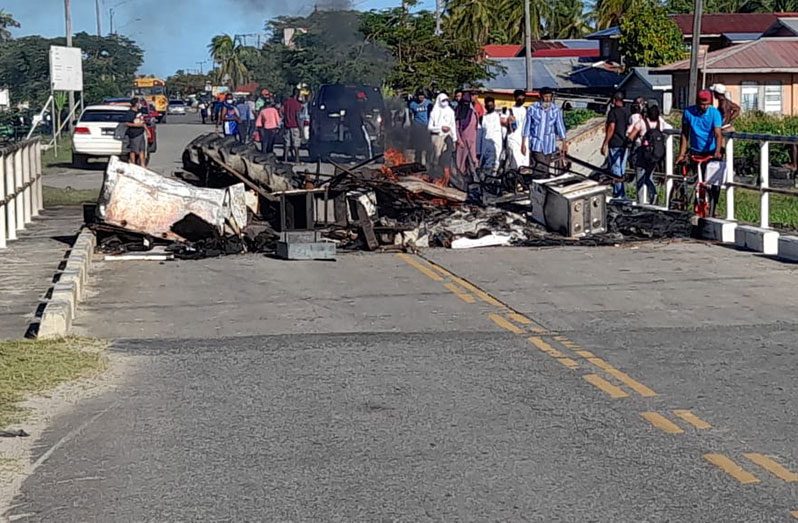POLICE and firemen were deployed to Dartmouth, Region Two, early Tuesday morning after residents protesting the manslaughter charge instituted against a SWAT rank for the shooting death of Orin Boston, began lighting fires and blocking the main road with debris.
The protest began around 04:00 hours and up to press time on Tuesday, the situation had not changed.
Residents placed a banner with the words “ Justice for Junior Orin aka Bat. We will not be silent” across a bridge which is the only access point to Charity . Boston was a father of two young children and operated the popular “Ease Meh Stress” bar.
On Friday, police constable and SWAT team member, Sherwin Peters was charged for manslaughter and was granted $1M bail. Peters, a resident of Central Amelia’s Ward, Linden, is the one who reportedly fired the fatal shot. Boston was lying in his bed and was unarmed at the time of the shooting.
Meanwhile, the Commander of Region Two, Woman Superintendent Denise Griffith said that the situation is not calm and residents have warned that the protest will continue if justice isn’t served.
The residents and Boston’s relatives are calling for the upgrade of the manslaughter charge to murder, since according to them Boston was unarmed, had no criminal history and was not wanted for any offence.
Tires, pieces of wood and other debris were set on fire on the bridge causing a disruption in the free flow of traffic. Vehicles were unable to move beyond that point. School children and businesses were predominantly affected.
Orin Boston Snr. warned that the protest action will continue until the case is re-heard. He is calling for the police constable to be charged with murder instead of manslaughter. He added that his son was shot in his sleep and is therefore calling for justice.
Boston was shot during an anti-crime operation. The SWAT unit was reportedly searching for prohibited items in Boston’s house but nothing illegal was found. The investigation into the shooting was conducted by the police’s Office of Professional Responsibility (OPR) and the charge was later instituted based on the advice of the Director of Public Prosecutions (DPP).



.jpg)








